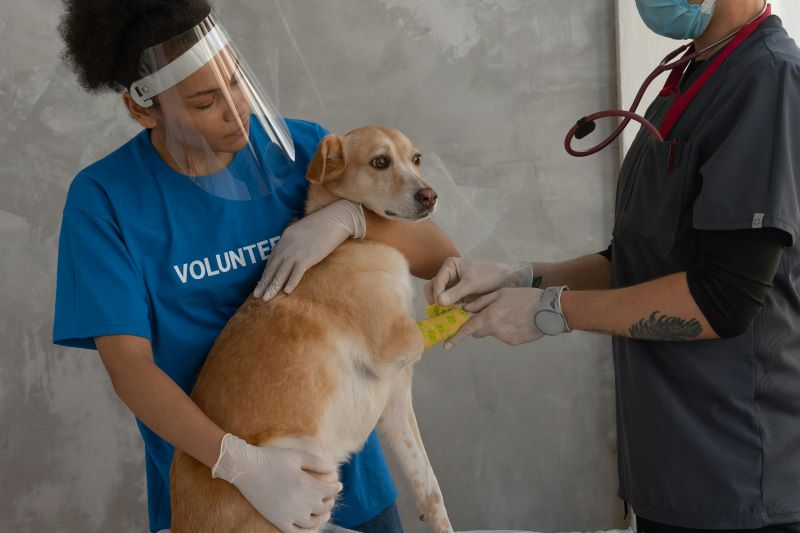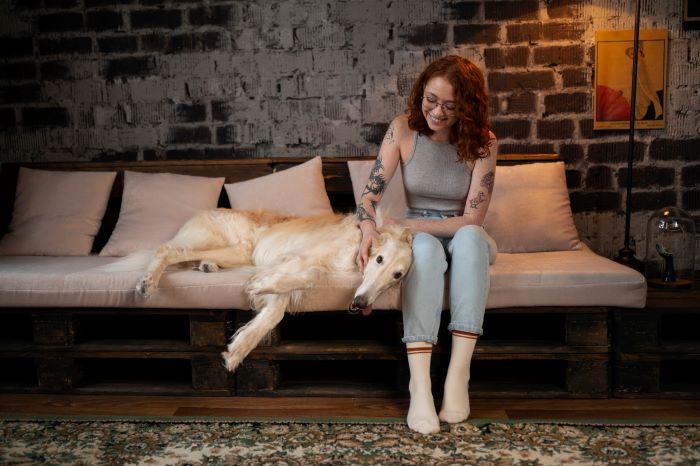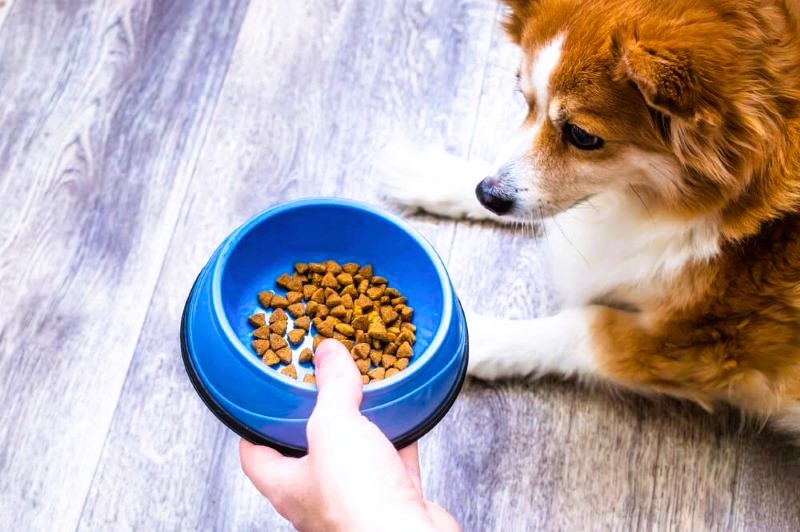Puppy’s first vet visit: During your first veterinarian visit, it is important to establish a routine for your dog’s healthcare. This follows both individuals who just got a new pet and people who are nearing the close of their adoption procedures. When you take your dog in for his initial checkup, be sure to bring along his medical records and a list of questions. The correct carrier is essential, as is avoiding overfeeding your dog before a visit leading up to the performance.
How do you prepare for your puppy’s first vet visit?
Finally, you must be ready to talk about concerns freely and give accurate information about their health and behavior. Here’s what to do at your dog’s first checkup.
When is the best time to take your dog to the vet?
Going in for checkups with the vet on a regular basis is the greatest approach to keep your dog healthy. Once your new pet has settled into its new home—which should be within a few days—it is imperative that it sees a vet.
The primary goal of the first visit to the vet is to establish the foundation for the pet’s health, review past medical records, check vaccination records, and plan a treatment strategy. Plus, you may at this time discuss any concerns you may have regarding your new buddy.
What should I expect when I go to the vet for the first time?
The veterinarian will likely greet you with a smile and do a comprehensive examination of your new pet’s health on your first visit. These experts will discuss your pet’s needs, vaccinations plan, and good eating habits.
Feel free to ask questions; doing so is helpful. VETs can help you with many things, including taking care of your pet’s health. As you talk to the vet about your dog’s health, diet, and behavior at their first visit, the vet will also look at their medical background.
Useful checklist for a puppy’s first vet visit.
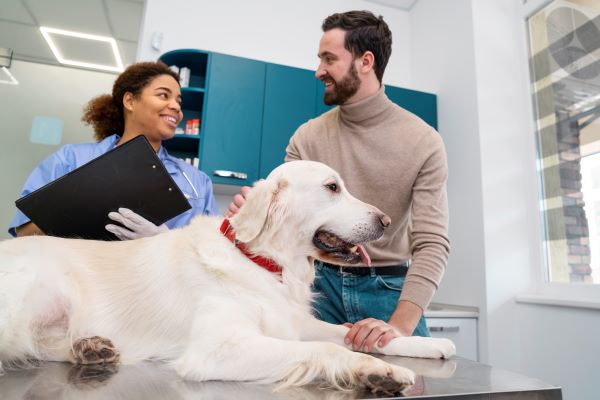
Be ready for your dog’s first vet visit with this checklist.
1. Schedule the appointment.
The first step is to schedule an appointment on the calendar. While certain practices may require several months to schedule an appointment, others have instant openings. If you want to adopt a dog, you should finish the application process before taking the dog home. This will help make sure that you get the time and day you want for the adoption process. In general, veterinary consultations can be scheduled over the phone or online.
2. Preparing the visit in advance
Before you leave for your visit, ensure that your dog has not consumed a massive meal. It is better to wait a few hours after feeding. If not, ensure that the newly adopted dog is secured in a dog seatbelt for the duration of the journey to the veterinarian. A crate or carrier may be a safe and efficient alternative for such transportation. Furthermore, assure that they are wearing an ID tag and are properly hooked and collared.
3. What to bring to the vet
You’ll need a few things for your first trip to the vet with your pet, which includes:
- Medical records: The vet will be quite grateful if you have any existing medical records or vaccinations history.
- Existing medications: If your dog is on any medications or supplements, bring them with you for a checkup.
- Comfort item: Remember to bring their favorite foster toy or a soothing blanket – familiar items might create a sense of security throughout the visit.
- All your questions: Prepare yourself for any questions or concerns you may have.
4. During the visit
Every vet appointment begins with a veterinarian’s technician weighing your dog on a scale. Subsequently, the veterinary technician will ask questions about your dog’s health and past in order to verify that the medical record for your pet is recent.
Your dog will then be checked from nose to tail by the veterinarian, who will inspect its teeth, ears, and more. At this time, you should share any existing illnesses or concerns that your dog may have. Additionally, this time provides an ideal situation to discuss preventive measures, including the protection against fleas and ticks, parasites, and dental health. Further, a vet technician may be called to help in the carrying out of vaccines if that is what is being considered.
5. Care and follow-up
Your veterinarian will likely arrange a schedule for additional care and inform you of any necessary follow-ups after your dog’s initial visit. Depending on the specific requirements of your dog, this might involve coming vaccinations, dental examinations, or preventive therapies.
During the initial advice, they may address any issues that arose or provide dietary recommendations .Please do not hesitate to contact your veterinarian with any queries or observations between visits.
Are there any specific questions I should ask the vet?
Before going to the clinic, you may think, “What should I ask the vet during my visit?” This is a fantastic question, and a lot of pet-parents find it useful to write down specific questions before their consultation. Here is a selection of helpful inquiries to get the gears turning:
- What should I feed my dog?
- What is the most effective preventative medication for my dog?
- Should I get my pet spayed or neutered? If so, when?
- Is my dog up to date with all vaccinations?
- How many times a day should I walk my dog?
- In an emergency, where should I take my dog?
What does the puppy’s first vet visit cost?
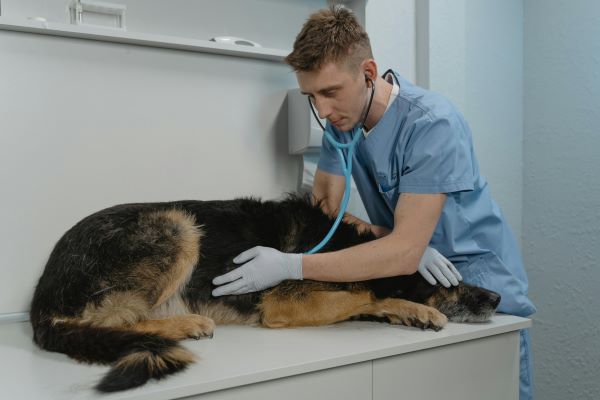
The first-time vet visits for puppies and dogs cost $50–100. The cost varies by region, vet-recommended treatments, and any additional treatment or tests. Some vets offer introductory checkup and vaccine packages.
Pet insurance may cover future medical expenditures. During the appointment, discuss all extra expenses and fees, as veterinary care is an investment in your pet’s health. Prior to your dog’s veterinary care, create a budget and plan accordingly.
Why is it important to develop a good relationship with your dog’s veterinarian?
Your dog and you need a good relationship with the vet for several reasons.
You may share your dog’s health concerns and observations, which is its main benefit. This connection guarantees that your vet has an entire picture of your pet’s health history, resulting in a more precise diagnosis and specific treatment.
Building an enjoyable bond with your vet not only ensures a nice visit, but it also minimizes your dog’s worry and tension. A veterinarian’s guidance on preventive measures, dietary issues, and general health also leads to an increase in self-assurance. A positive relationship with a dog’s vet acts as the foundation for expert and preventive medical care, ensuring your pet’s longevity, happiness, and health.
Also read: The complete guide to senior dog supplements: Keep your furry friend healthy
FAQ, Puppy’s first vet visit
How long does the puppy’s first vet visit take?
The first vet appointment takes 30–60 minutes. Then, the vet can address your concerns and queries related to the dog. They can also look over your dog’s medical records and give him or her a full checkup. The primary objectives of this whole lesson are to get you began on future care and help you understand the health of your dog.
What happens if my dog is scared or insecure at the vet’s?
You shouldn’t worry about your dog at the vet. Our vets and staff are patient with scared pets to make their stay as pleasant as possible. Use food or praise to develop a positive relationship with vet appointments, and bring a favorite toy to make them feel safer.

